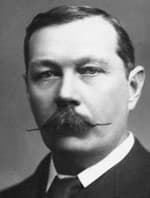Arthur Conan Doyle
Critique • Works • Views and quotes

Born
1859
Died
1930
Publications
Novels, stories, pamphlets
Writing language
English
Literature
• The Adventures of Sherlock Holmes (1892)
• The Hound of the Baskervilles (1902)
Novels
• A Study in Scarlet (1887)
• The Hound of the Baskervilles (1902)
Novel Series
• Sherlock Holmes (1887)
Stories
• "The Red-Headed League" (1891)
• "A Scandal in Bohemia"(1891)
• "Silver Blaze" (1892)
• "The Adventure of the Speckled Band" (1892)
Story Collections
• The Adventures of Sherlock Holmes (1892)
• The Memoirs of Sherlock Holmes (1892)
• The Return of Sherlock Holmes (1892)
British Literature
• A Study in Scarlet (1887)
• The Sign of Four (1890)
• The Adventures of Sherlock Holmes (1892)
• The Memoirs of Sherlock Holmes (1894)
• The Hound of the Baskervilles (1902)
• The Return of Sherlock Holmes (1905)
• The Lost World (1912)
Adventure Literature
• The Lost World (1912)
Crime and Mystery
• A Study in Scarlet (1887)
• The Sign of Four (1890)
• The Adventures of Sherlock Holmes (1892)
• The Memoirs of Sherlock Holmes (1894)
• The Hound of the Baskervilles (1902)
• The Return of Sherlock Holmes (1905)
Crime and Mystery Series
• Sherlock Holmes (1887–1926)
Crime and Mystery Stories
• "The Red-Headed League" (1891)
• "A Scandal in Bohemia" (1891)
• "Silver Blaze" (1892)
• "The Adventure of the Speckled Band" (1892)
• "The Greek Interpreter" (1893)
• "The Stockbroker's Clerk" (1893)
Horror
• The Hound of the Baskervilles (1902)
Thrillers
• The Hound of the Baskervilles (1902)
Science Fiction
• The Lost World (1912)
Science Fiction Stories
• "The Great Keinplatz Experiment" (1888)
On books, writers and writing
1923
I had for some time from 1884 onward been engaged upon a sensational book of adventure which I had called The Firm of Girdlestone, which represented my first attempt at a connected narrative. Save for occasional patches it is a worthless book. I felt now that I was capable of something cleaner and crisper and more workmanlike. [Émile] Gaboriau had rather attracted me by the neat dovetailing of his plots, and [Edgar Allan] Poe's masterful detective, M. Dupin, had from boyhood been one of my heroes. But could I bring an addition of my own? I thought of my old teacher Joe Bell, of his eagle face, of his curious ways, of his eerie trick of spotting details. If he were a detective he would surely reduce this fascinating but unorganized business to something nearer to an exact science. I would try if I could get this effect. It was surely possible in real life, so why should I not make it plausible in fiction? It is all very well to say that a man is clever, but the reader wants to see examples of it—such examples as Bell gave us every day in the wards....
I would not write a Holmes story without a worthy plot and without a problem which interested my own mind, for that is the first requisite before you can interest any one else. If I have been able to sustain this character for a long time and if the public find, as they will find, that the last story is as good as the first, it is entirely due to the fact that I never, or hardly ever, forced a story....
I do not wish to be ungrateful to Holmes, who has been a good friend to me in many ways. If I have sometimes been inclined to weary of him it is because his character admits of no light or shade. He is a calculating machine, and anything you add to that simply weakens the effect. Thus the variety of the stories must depend upon the romance and compact handling of the plots.
"The Truth About Sherlock Holmes"
1927
[Doyle's personal selection of the twelve best Holmes stories]
"The Speckled Band"
"The Red-Headed League"
"The Dancing Men"
"The Final Problem"
"A Scandal in Bohemia"
"The Empty House"
"The Five Orange Pips"
"The Second Stain"
"The Devil's Foot"
"The Priory School"
"The Musgrave Ritual"
"The Reigate Squires"
[The list purposely excludes stories from the not yet released collection The Case-Book of Sherlock Holmes, from which Doyle said he would add "The Lion's Mane" and "The Illustrious Client" to the list.]
"My Favourite Sherlock Holmes Adventures"
One likes to think that there is some fantastic limbo for the children of imagination, some strange, impossible place where the beaux of [Henry] Fielding may still make love to the belles of [Samuel] Richardson, where [Walter] Scott's heroes still may strut, Charles Dickens's delightful Cockneys still raise a laugh, and [William Makepeace] Thackeray's worldlings continue to carry on their reprehensible careers. Perhaps in some humble corner of such a Valhalla, Sherlock and his Watson may for a time find a place, while some more astute sleuth with some even less astute comrade may fill the stage which they have vacated.
"Mr Sherlock Holmes to His Readers"

